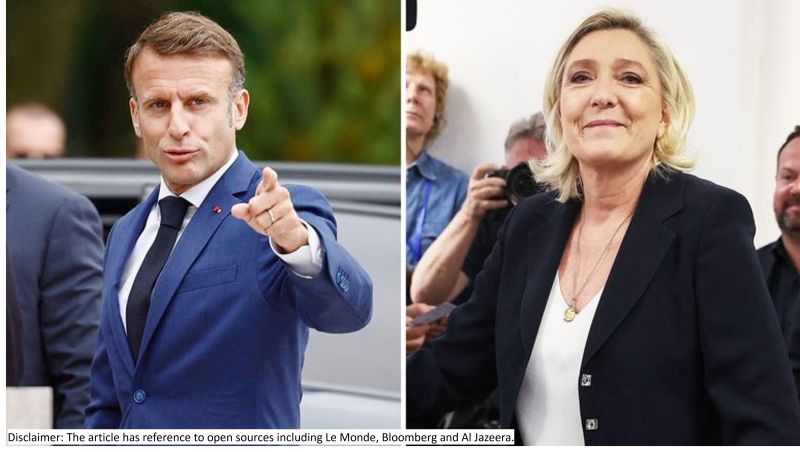Far-right National Rally (RN) made huge gains in the first round of the snap parliamentary elections in France on Sunday, June 30, which witnessed 65.8% voter turnout, the highest since 1997. Marine Le Pen’s RN and allies took about 33.1% of the vote. New Popular Front (NFP), an alliance of left-wing parties, received 28% votes while Macron’s centrist Ensemble alliance (Renew and its allies) obtained 20.8% of the votes.
Three parties will go to second round on July 7. Le Pen and RN’s young President Jordan Bardella, her protege and candidate for prime minister, have said their party is chasing an absolute majority – a total of 289 seats – in the 577 member National Assembly, France’s lower house of parliament. If the RN does manage to secure an absolute majority, it would create a tense period of “cohabitation” – when the president is from a different political party than the majority of MPs – with Macron, who has pledged to serve out his term until 2027.
The RN’s chances of winning power depend on political dealmaking by its rivals. Macron and left-wing party leaders have announced they would consider pulling candidates where they are placed third to keep the far right from power. Macron has called for a “broad” democratic alliance against the far right.
Should RN fall short of the absolute majority, a likely scenario as per analysts, it would lead to protracted negotiations to form a sustainable government.
In France, the share of voters backing the far right has increased significantly since Macron was elected president. NR got 20 percentage points more votes this time compared to 2017, as per Bloomberg.
76 candidates have been elected in the first round, receiving over 50% of valid votes and 25% of registered electorate. In 501 constituencies, all candidates whose vote count exceeds 12.5% of registered voters qualify for the second round on Sunday July 7.
306 constituencies are expected to have three-way runoffs, with both the leftist NPF and Macron’s Renew facing the NR or its allies in 226 of them. In 2022, there were only eight three-way runoffs. Jean-Luc Melenchon, NPF leader said he would withdraw candidates who placed third in the first round of elections, to ensure two-horse races to defeat the highest number of far-right RN candidates in the coming vote. PM Gabriel Attal announced that candidates of Macron’s coalition who came in third would also withdraw in order to support “another candidate who, like us, defends the values of the Republic.” The right-wing Les Republicains, who came in fourth with 6.6%, issued no national instructions leaving the French to express themselves as per their conscience.
When no candidate reaches 50% in the first round, the top two contenders automatically qualify for the second round, as well as all those with 12.5% of registered voters. In the run-off, whoever wins the most votes takes the constituency.






